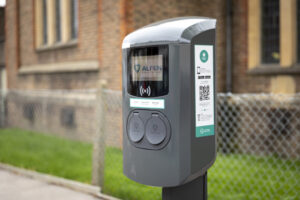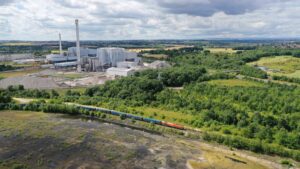The secrets of Nottingham’s sustainability success
Nottingham is earning a reputation for being a city with sustainability at its heart. So what makes it different to the other core cities in the UK?
Newly published government data shows that since 2011-12 there has been a significant fall in the city’s carbon emissions due to a reduction in domestic energy use. It indicates a 33% reduction in carbon emissions since 2005, beating a target set by Nottingham City Council to reach a 26% reduction by 2020.
Councillor Alan Clark, portfolio holder for energy and sustainability, said of the news: ‘It’s a great achievement to have met this important target four years early. Nottingham is at the forefront of sustainability awareness and these latest figures maintain the city’s position as the UK’s most energy self-sufficient city.’
Without doubt, there is political commitment to the agenda in the city where Robin Hood Energy has become a pioneering and leading, if small, player in the domestic electricity and gas markets and has fast gained a reputation for value for money, as shown by a recent Which? report. Borne out of the council’s quest to tackle fuel poverty, it’s a not-for-profit success.
But providing cheaper fuel on its own doesn’t reduce carbon emissions. It’s investment in low carbon alternatives and improving building stock that’s achieving that.
It’s no coincidence that Nottingham’s carbon emissions reduction coincides with its programme of ‘energy saving investments in social housing such as external wall insulation programmes which have also been open to private owners and the installation of solar panels on over 4,000 of council house roof tops’, said Clark.
But here’s the real insight – Nottingham has been prepared to acknowledge that carbon reduction goes hand-in-hand with economic success. You won’t hear people in the city saying ‘we can’t do that it will scare off developers or investors’. Quite the opposite, it’s attracting the sort of businesses who want to be part of this responsible growth. Its confident approach follows from investment in human capital as well with a number of experienced and respected officers joining the council to lead the agenda and support its cabinet’s ambitions.
Councillor Nick McDonald, portfolio holder for business, growth and transport said: ‘A significant part of this reduction – around 13% – is due to the popularity of public transport, cycling and walking in Nottingham. We have Europe’s largest fleet of electric buses, the addition of the new Chilwell and Clifton tram routes and £6.1m invested in improving cycling routes to provide great alternatives to using cars to get around the city.’
It’s also galvanising the efforts of long-standing businesses in the city, like Boots and its two universities – both of which are considered to be amongst the most committed and highest performing universities in terms of sustainability.
The University of Nottingham has been placed first in the University of Indonesia’s Green Metric for the past three years and has never been out of the top two places since its inception. Nottingham Trent University consistently performs well in the index and, with a combined total of students well over 60,000, that’s a good proportion of the city covered.
Nottingham’s political commitment and clear strategy have brought confidence and a long-term approach that has enabled the city to invest its own money wisely as well as attract government funded programmes like Go Ultra Low.
The city council, together with Nottinghamshire County Council and Derby City Council, are among the UK’s exemplar Go Ultra Low Cities, implementing a wide range of new initiatives to make electric vehicles and sustainable transport more accessible.
 At the same time, more than 50 gas-powered buses are heading to the streets of Nottingham after a successful bid for government funding was confirmed to augment the 50+-strong fleet of electric buses in the city.
At the same time, more than 50 gas-powered buses are heading to the streets of Nottingham after a successful bid for government funding was confirmed to augment the 50+-strong fleet of electric buses in the city.
Nottingham City Transport, in partnership with the council, has been awarded funding under the government’s OLEV Low emission bus scheme, meaning £4.4m has been awarded to buy 53 bio-methane fuelled double deckers and to install the fuelling infrastructure at its Parliament Street garage.
The city council was also successful in its bid for £920,000, which will fund on-street rapid charging infrastructure, improving the range and flexibility of the council’s electric bus fleet – currently the largest in the UK and Europe. This funding will also be used to construct the charging base for the 13 new electric buses which are shortly to arrive in Nottingham.
The new gas double decker buses will be quieter, smoother and cleaner and will ultimately provide an estimated carbon emission saving to the city of 23,204,856 kilograms over the lifetime of the vehicles compared to conventional diesel buses.
Councillor Nick McDonald, portfolio holder for business, growth and transport, said successful bids like this are ‘enabling Nottingham to become a centre for low carbon, future-proofed transport, shaping our future as the UK’s greenest transport city with environmentally positive transport’.
He believes it will have a knock-on effect on the local economy and skills base, providing local opportunities to develop local pathways into employment, with bus companies also offering apprenticeships and work experience connected directly to this new technology.
The city is already making waves towards becoming a trailblazer Low Emission City through:
- Europe’s largest battery electric bus fleet with 45 fully battery electric buses in operation on our Linkbus network and 13 more electric buses on order
- Expansion of the electric NET tram system to three lines spanning 34km
- Inclusion of ULEVs as part of the council’s current fleet makeup
- Electric vehicles operating in our growing car club
- Electric vehicle charging infrastructure already in place at key Park and Ride services, workplaces and destinations
- Two local private hire companies operating six full electric and 150 hybrid vehicles
- Only Go Ultra Low shortlisted city to be awarded Lighthouse City status by EU. Funding secured for REMO Urban project for smart low carbon transport, energy and ICT projects
- Local commitment to the electrification of the Midland Mainline
- Local Authority owned, Robin Hood Energy and Enviroenergy generating and supplying local sustainable power for residents, businesses and transport
- The council has prepared a prospectus highlighting the key investment areas which will help to support Nottingham’s ambition for becoming a low emission city.
All of this is impressive. The city, led in the main by the council, has made the low carbon agenda a priority. It makes good business sense to reduce its own consumption and bills, to reduce fuel poverty and create an environment that business can buy-in to and support. While other provincial core cities have downsized their capabilities, Nottingham has invested and is clearly reaping the rewards in the triple bottom line. Reduced costs, happier citizens, better business.
Photo by ian.plumb 
Photo by Railway Dave and Jim Freebury 















